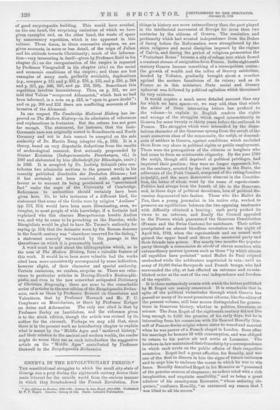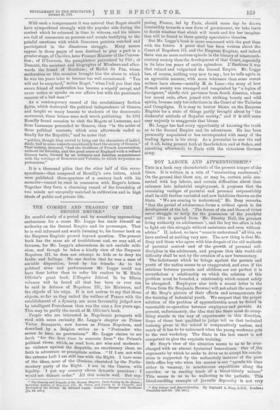GENEVA IN THE REVOLUTIONARY PERIOD.* THE constitutional struggles to which
the small city-state of Geneva was a prey during the eighteenth century derive their main interest for the outside world from the curious manner in which they foreshadowed the French Revolution. Few * Les Affnires Ca Gee ire, 1780.1783 Lettree de Jean Beget, 1783.1788, Published by P. P. Eoget. Geneva ; Georg at Cie. Paris : Libraric Pied:backer, things in history are more extraordinary than the part played in the intellectual movement of Europe for more than two centuries by the citizens of Geneva. The resolution and pertinacity which had wrested independence from the Dukes of Savoy before the Reformation were strengthened by the stern religious and moral discipline imposed by the regime of Calvin, and during the period of religious persecution the "Protestant Rome" became a city of refuge into which flowed a constant stream of emigration from France. Inthe eighteenth century Geneva became something of a cosmopolitan centre : the growth of wealth and the influx of literary celebrities, headed by Voltaire, gradually brought about a reaction against the austere fanaticism of its rulers; and as in France so in this miniature State social and literary upheaval was followed by political agitation which threatened its very existence.
It would require a much more detailed account than any for which we have space—or, we may add, than that which the editor of these interesting letters has prefixed to the volume—to explain to English readers the rights and wrongs of the struggles which raged intermittently in Geneva for some twenty or thirty years before the outbreak in France. The struggles which were intensified by the dispu- tatious character of the Genevese sprang from the revolt of the most numerous class of the community, the natifs, or descend- ants of settlers in Geneva, against conditions which excluded them from any share in political rights or public employment. These were the prerogatives of the citizens or burghers who had come to form an aristocratic oligarchy. By the year 1780 the nail's, though still deprived of political privileges, had improved their position : they were no longer oppressed, but, on the contrary, courted by the two parties in the State, the adherents of the Petit Conseil, composed of the ruling families (ndgatifs), and the more democratic element in the Constitu- tion, the latter of whom went by the name of representants Politics bad always been the breath of life to the Genevese, and, in these days of political decadence, love of political dis- cussion degenerated into faction. Those who like Mallet du Pan, then a young journalist in his native city, worked to preserve an equilibrium between the two opposing tendencies with difficulty obtained a hearing : each party pushed its views to an extreme, and finally the Council appealed to the Powers which guaranteed the Genevese Constitution (France and the Swiss Cantons) for assistance. Their action precipitated an almost bloodless revolution on the night of April 8th, 1782, when the representants and an armed mob gained the upper hand and threw the senatorial party and their friends into prison. For nearly two months the popular party through a commission de afirete of eleven members with extraordinary powers (powers such as those (4 by which almost all republics have perished" noted Mallet du Pan) reigned unchecked while the arbitrators negotiated in vain ; until an army of 10,000 Swiss Savoyards and French troops, who had surrounded the city, at last effected an entrance and re-esta- blished order at the cost of the real independence and freedom of the republic.
It is these melancholy events with which the letters published by M. Roget are mainly concerned. It is remarkable that in spite of the political vicissitudes through which Geneva has passed so many of its most prominent citizens, like the editor of the present volume, still bear names distinguished for genera-
tions in Genevese history, whether in politics, literature, or science. The Jean Roget of the eighteenth century did not live long enough to fulfil the promise of his early days, but he is interesting from his connexion with Sir Samuel Homily (him- self of Franco-Swiss origin) whose sister he wooed and married when he was pastor of a French chapel in London. Soon after his marriage he became ill with consumption, and was obliged to return to his native air and settle at Lausanne. The brothers-in-law maintained theirfriendship by a correspondence in which each wrote on the public affairs of their respective countries. Roget had a great affection for Romilly, and wee one of the first to discern in him the signs of future eminence and to urge him to embrace the career in which he was to win fame. Romilly described Roget in his Memoirs as "possessed of the genuine sources of eloquence ; an ardent mind with a rich imagination, and exquisite sensibility," and as being a great admirer of his countryman Rousseau, "whose seducing elo- quence," confesses Romilly, "so entranced my reason that was blind to all his errors." With such a temperament it was natural that Roget should have sympathized strongly with the popular side during the contest which he returned in time to witness, and his letters are full of comments on persons and events testifying to the painful emotions with which Genovese patriots watched and participated in the disastrous struggle. Many names appear in these pages of men destined to play a part in a greater stage, of Clavier°, later Finance Minister of the Conven- tion; of DIvernois, the pamphleteer patronized by Pitt ; of Dumont, the assistant and biographer of Mirabeau and after- wards the friend of Bentham; of Mallet du Pan, whose moderation on this occasion brought him the abuse to which
he was ten years later to become too well accustomed. " You will not be surprised," writes Roget, "'when I tell you that this sworn friend of moderation has become a negatzf enrage, and
never writes or speaks on our affairs but with the passionate rancour of a bad man!"
As a contemporary record of the revolutionary faction Oghts, which destroyed the political independence of Geneva and taught so many lessons to students of the democratic movement, these letters were well worth publishing. In 1781 Homily found occasion to visit the Begets at Lausanne, and from Lausanne proceeded to Geneva, then "in the midst of these political contests, which soon afterwards ended so fatally for the Republic," and he notes that "politics, though they served to bring out the characters of indivi- duals, had in sonic respects considerably hurt the society of Geneva." That society, however, "had the liveliness of French conversation, without its frivolity, and the good sense of England with a refined literary taste, formed by an intimate and familiar acquaintance with the writings of Rousseau and Voltaire, to which we possess no pretensions."
It is a thousand pities that the other half of thia corre- spondence—that composed of Romilly's own letters, which wore published three-quarters of a century back with his memoirs—cannot be read in connexion with Roget's letters. Together they form a charming record of the friendship of two minds not unequally matched in cultivation and in high ideals of public and private life.























































 Previous page
Previous page